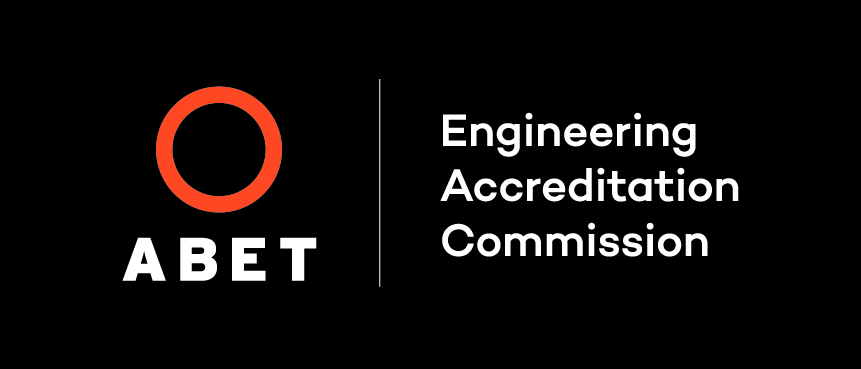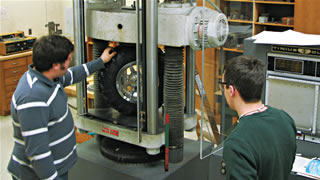Mechanical Engineering
Education That Leads to Success!
- At LSSU we strive to equip our students and to provide a learning environment that maximizes success both in their studies and in their future careers.
- Since a typical LSSU engineering class has about 15 students, you will have the chance to work closely with your instructors, all of whom are full-time faculty members, rather than graduate student assistants.
- Recognizing that learning comes through doing as well as listening, all LSSU engineering programs are designed to include a significant amount of engineering practice along the way.
- The emphasis in the curriculum is to provide a solid background in the core subject matter of the Mechanical Engineering discipline, including solid mechanics, thermal-fluids engineering, and controls, all of which find wide application across many industries and other fields of human endeavor.
- The Robotics and Automation concentration, almost unique at the undergraduate level, prepares students for rewarding careers in the burgeoning fields of industrial automation, service robots, and mobile robotics.
- The Vehicle Systems concentration focuses on the performance of surface vehicles of all sorts, whether on the road, terrain, rails, or even the sea, addressing such phenomena as handling, acceleration, ride, roll stability, pulling power, and noise and vibration.
- All LSSU engineering students participate in a senior project.
Why Students Choose LSSU
- Emphasis is on preparing you to solve real-world engineering problems.
- You will participate in multidisciplinary, industrial or research based senior engineering design projects which emphasize teamwork, communications, project management, customer relations and ethics.
- You will learn numerous software packages for CAD, CAM, finite element analysis, programmable logic controllers, robots and technical analysis.
- Cooperative education opportunities are available.

The Mechanical Engineering bachelor’s degree program is accredited by the Engineering Accreditation Commission of ABET, http://www.abet.org
Concentrations:
- Vehicle Systems
- Robotics and Automation
- General
A minor in Mechanical Engineering is available for non-engineering students.

Meet our Robots
- Staubli: One of the fastest and most accurate articulated robots with six degrees of freedom.
- Adept: Made by the only U.S. robot manufacturer and one of the most widely used selective compliance articulate robot arm (SCARA) type robots fitted with machine vision
systems and cameras. - Fanuc: From the Arcmate family with six degrees of freedom built by one of the world’s largest robot manufacturers.
- Motoman: One of the three largest robotics companies and one of America’s fastest-growing companies.
Concentrations
Vehicle Systems Concentration
The Vehicle Systems concentration focuses on the performance of surface vehicles of all sorts, whether on the road, terrain, rails, or even the sea, addressing such phenomena as handling, acceleration, ride, roll stability, pulling power, and noise and vibration. You’ll analyze vehicle performance using analytical skills and simulation, test for it using modern instrumentation, sensors and a vehicle dynamometer, and design for it using a perspective on vehicle dynamics phenomena that draws on analogies between different modes of transport.
You’ll learn how to project vehicle performance through analytical skills and computer simulation, how to test using modern instrumentation, and how to design for it using a perspective of the vehicle as a complete system. As you progress, you’ll develop a competence with specific sub-systems and parts.
With a Mechanical Engineering degree career opportunities are wide open including such areas as product design, component design, automotive systems design and testing, packaging and manufacturing design, process design, and product and/or process development.
Student taking the robotics option you will find companies that are involved in robotics and automation specifically seek out LSSU graduates.
For those who take the vehicle systems option will be prepared for a future in one of the surface vehicle industries: Automotive, Rail, On-Highway (Heavy Trucks), Off-Road & Recreational, Agriculture & Construction, and other industries.
Facilities
Starting out on the Right Foot!
Freshmen students get their first robotic experience with LEGO Mindstorms®.
Vehicle Systems Option
You’ll learn how to project vehicle performance through analytical skills and computer simulation, how to test using modern instrumentation, and how to design for it using a perspective of the vehicle as a complete system. As you progress, you’ll develop a competence with specific sub-systems and parts.

Robotics and Automation Option
The Robotics and Automation Laboratory has over $1 million in robotics equipment. Courses in systems integration and machine vision, automated manufacturing systems, and robotics engineering prepare you for robotics careers in the fields of applications, design, software, equipment development, and controls. Students work with Karel and V+ software, programmable logic controllers (PLCs), and application of C programming concepts.

Staubli and Adept robots share rotary index tables and a roller conveyor system in an L-line set-up controlled by V+ programming and PLCs.
Senior Projects – Real World Experience
Career Choices
Technical Areas
- Aerodynamics
- Biomedical
- Energy Conversion
- Heat Transfer
- Materials and Structures
- Noise and Vibration
- Product Design
- Robotics and Automation
- Systems Design
Industries
- Aerospace
- Automotive
- Chemical
- Consulting
- Defense Contractors
- Heating, Ventilation, Air Conditioning (HVAC)
- Manufacturing
- Medical
- Nuclear Power
- Renewable Energy
- Transportation


